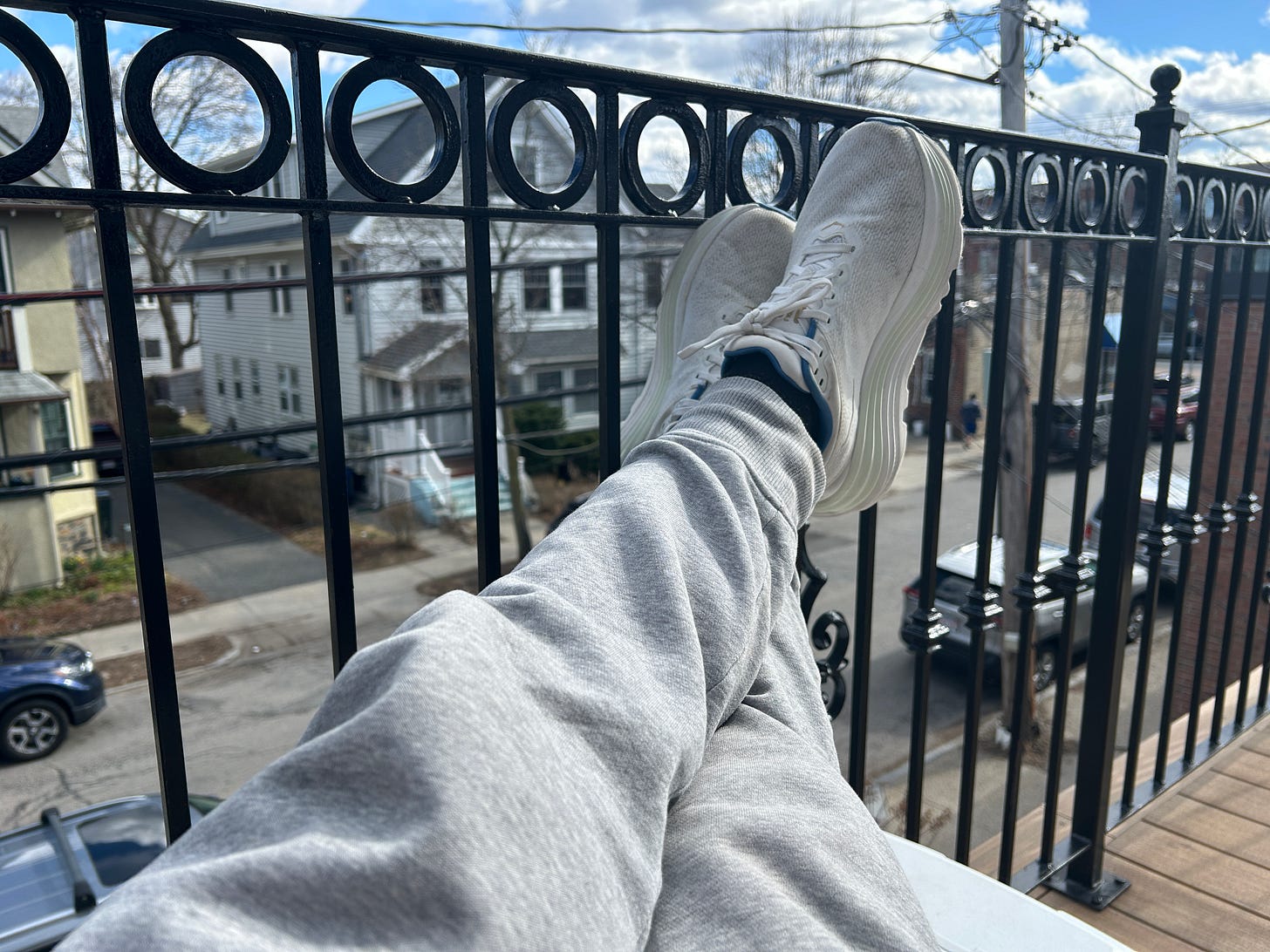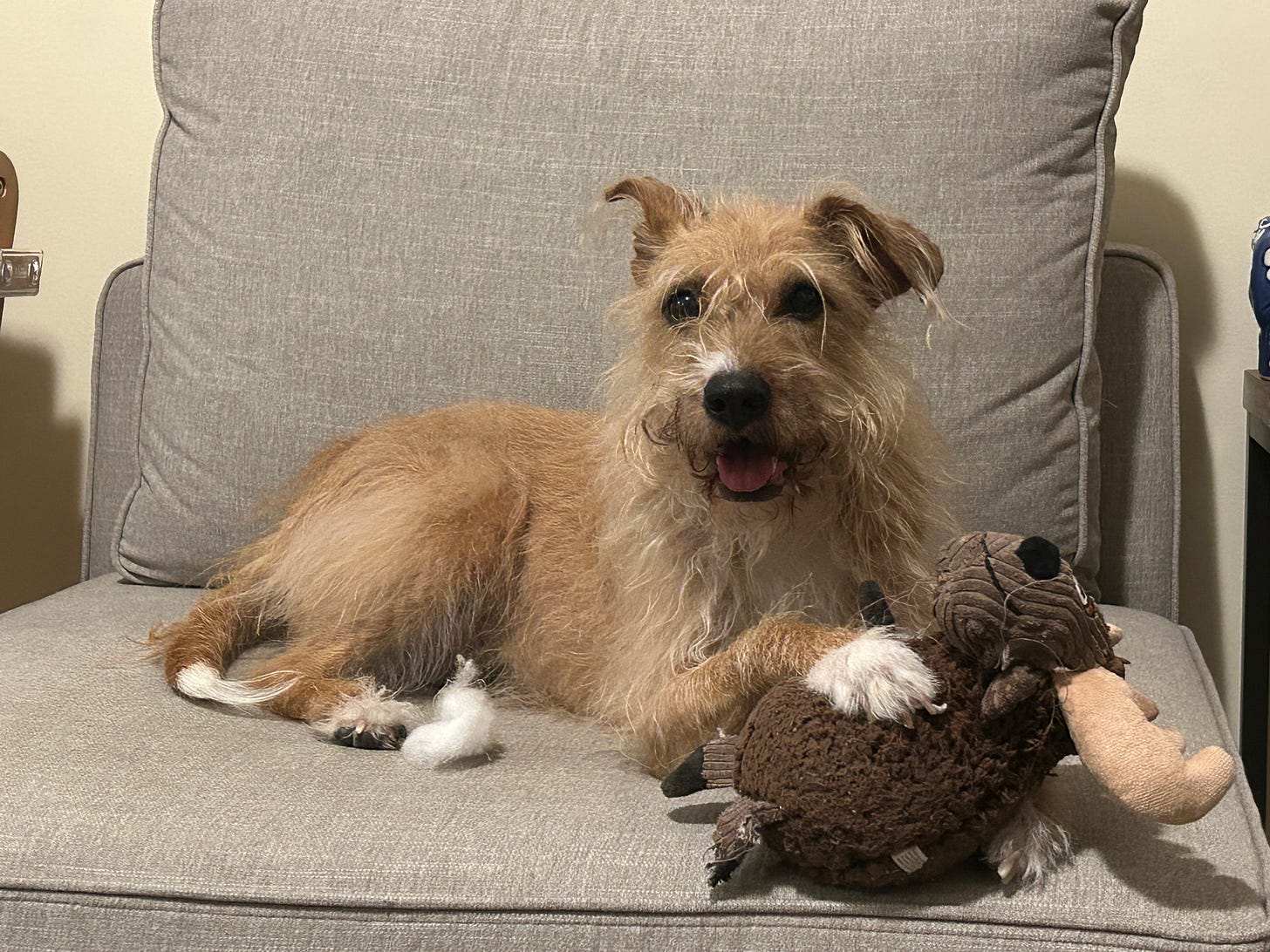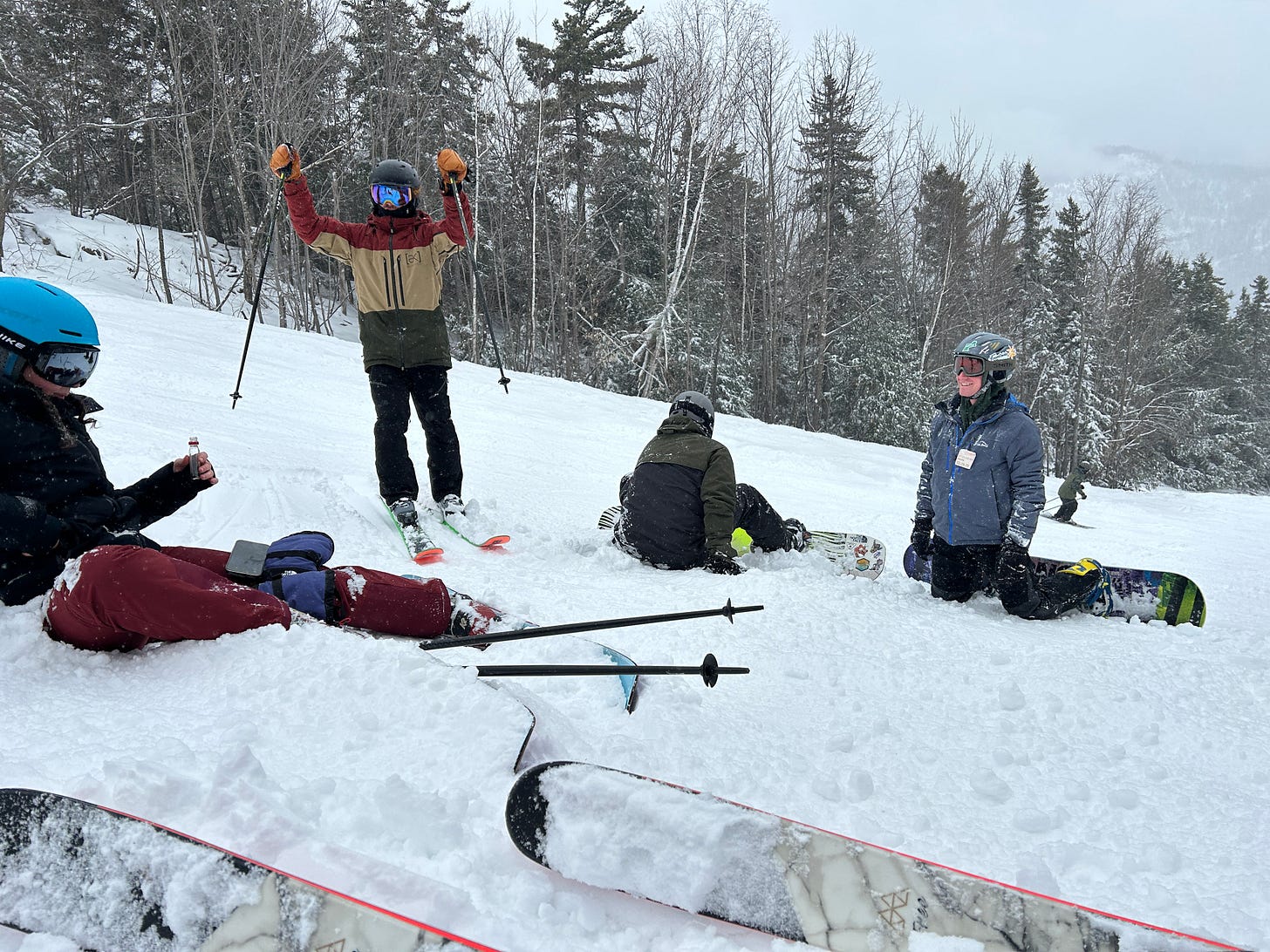Joe Hudson's Art of Accomplishment
On creating a life you actually want
I shared with Art of Accomplishment’s CEO. He said, “I've created this code for your audience; it will give them $300 off the Connection Course.” The code is CCOUTCOMES (no affiliate kickback).
Intro
I got an email that Joe Hudson was hosting a live rapid coaching session. I clicked the link and joined, Just for a little bit I told myself. Of course, I was there for the full 90 minutes, as I was when I first watched Joe rapidly bring the Zoom call question askers to the reality of the situation and feel the emotions of it.
One year ago, I shared a review of Joe’s Great Decisions Course - a five-week program I embarked on. Readers loved the review, and so did Joe. One reader told me he revisits it every few months, which blew my mind. Since then, 500 more people have joined this email list, so I’m resharing an updated version with additional insights. (see below)
I often listen to the Art of Accomplishment podcast, co-hosted by Joe and Brett. On a drive through New Hampshire, I listened to them talk about death, as Brett’s brother was terminally ill. In the middle of the podcast, Joe shared a poem that he wrote and shared at a friend’s funeral.
This was part of it:
I fall to my knees in gratitude of this illusion of me
It is what allowed me to laugh and cry and with you
My friend
It’s what allows me to feel, the endless depth of missing you now
I recall these lines off the top of my head, which speaks to how much it resonated with me. There’s a wisdom in there that few people I’ve ever met have come to know, let alone articulate in such an elegant few lines.
In another podcast episode, Joe told a story about his daughter’s “billion-dollar idea.” Not something that would make a billion dollars—something she wouldn’t sell for a billion dollars.
Wow. That resonated. I posted on Notes: I’m not trying to build a billion-dollar business, I’m trying to build something I wouldn’t sell for a billion dollars.
I messaged Joe a copy of his poem, and said:
In AoA world, making someone cry is among the nicest things you can do.
I was watching Joe do a coaching session, and the participant said something like, “I’m gonna cry.”
Joe said, “I’m already crying.”
“Really?”
“Yeah, I was crying as we were talking.”
It struck me that crying doesn’t necessitate tears streaming down the face, or an inability to speak. My intuition is that crying during a conversation without anyone even noticing is downstream of deep emotional fluidity.
The revelations per minute with this guy is second to nobody else I know of.
I’d wager Joe Hudson is one of the top active psychologists in the world, although he does not identify as one. What makes him such a good psychologist is that he’s not one—he’s not in an ivory tower writing papers, or behind closed doors helping a few wealthy clients. He’s in the trenches helping people in public.
Originally posted April 1, 2024, updated April 2025
Joe Hudson's Great Behavior Course
Freedom lies in the space between stimuli and response.
“Joe Hudson made me disappear.”
“I’m on the bleeding edge of existence.”
“Is this real change? I think this is real change.”
These were comments from participants in Art of Accomplishment’s Great Decisions Course.
In January 2024, I saw Joe Hudson, founder of Art of Accomplishment (AoA) on
’s Pathless Path Podcast. Inspired, I joined the info session for Joe’s Great Decisions course. It blew my mind. My eyeballs were pinned to the screen for 90 minutes. I cried.There were 100 people on the call. Joe selected volunteers for coaching sessions in front of the audience. They call it Rapid Coaching. I’d never seen anything else like it. For each session, things were emotional within 15 minutes. It was clear to me that Joe was fluent in the language of emotions, and I was not.
At the end of every value delivery chain is desired feelings. Improving our ability to feel emotions expands our ability to receive value. Savoring all emotions, looking forward to them, and flowing with them, to me, sounded like the ultimate skill. The man who loves all emotions can’t lose.
Joe calls it emotional fluidity. When I first heard the phrase, I knew I didn’t have it but would like to experience it. Many times in my life, I have felt emotionally illiterate. I might be too emotionally retarded to take this course, I thought. Then I realized, that is the reason I need to take this course.
The 5-week course began while I was both sick and traveling but they only run it once a year so I bit off more than I could chew. There were partner sessions, small group sessions, large group sessions, and solo work. I can talk about the intellectual lessons, but most of what I learned is nontransmissible because it was at the emotional level in the form of somatic experience.
Overall, the course was high quality, impactful, and useful. It’s the first course I’d buy for my children. Our decisions, which is the same as our behavior, determine a large part of our life experience.
Here are my highlights from the course:
Simplicity is powerful
Exercise:
“I feel _____ and that’s okay.”
Partner: “You feel _____ and that’s okay.”
Everything powerful is simple. And that’s okay has echoed in my thoughts for weeks.
I feel love and that’s okay.
I feel scared and that’s okay.
I feel helpless and that’s okay.
I feel confused and that’s okay.
I feel stupid and that’s okay.
I feel wonder and that’s okay.
I feel desire and that’s okay.
This activity validates feelings as acceptable and helps to neutralize resistance/self-conflict.
I didn’t think this is what we’d be doing in the Great Decisions Course. I thought we’d learn a formula for decision-making. But the key insight is that our decisions, our behavior, is driven by the emotional part of our system. By working with emotions, welcoming emotions, we can improve our decision-making.
Head Heart Gut
A revelation for me was that my neural network is more than just my brain. I knew this at an intellectual level but the course helped me tune into my heart and gut, which are also important neural networks. My gut especially was being neglected. I had no idea how much I was clenching my gut.
We did an exercise where we spoke from each neural network. What does your head say about that? What does the heart say? And what does the gut say? I learned my gut doesn’t speak good English. Some people spoke from their gut with animal noises.
At the beginning of each of the many course exercises, Joe states the purpose of the exercise. An aim of the head-heart-gut exercises is “to access many forms of our intelligence and integrate them together.”
VIEW
Vulnerability
Impartiality
Empathy
Wonder
This framework is the foundation that AoA is built on; and for me, VIEW is a good answer to the question, What is love?
The AoA podcast is part of the course content. Here’s Joe in episode 70:
“Meeting emotions with VIEW: Vulnerability, allowing it. Impartiality, being neutral. Empathy, keeping yourself company. Wonder, looking at the emotion as if you’re kid finding a turtle for the first time.”
“Emotional expression and moving emotions is great, but the most important thing is, how do I look at this with some curiosity, wonder, vulnerability, impartiality.”
Emotional Inquiry
This is the backbone of the course and a potent source of transformation.
Emotional Inquiry (EI) is like an audio-guided meditation where you conjure an emotional experience, listen to the audio, and see what happens.
From AoA podcast #96, which I highly recommend:
“[EI] is a tool for when you resist an emotional experience. It’s basically looking at the emotional experiences through the eyes of VIEW. It’s vulnerable, you’re actually feeling it, it’s impartial, you’re not trying to change it, you’re full of wonder, and having empathy for yourself. You’re not lost in the emotional experience but you’re not dismissing it. We teach it as a guided meditation but it can soon become automatic.”
“This is one of the most powerful tools if it’s applied. Most people will slow down on the application of it or find distraction because it can create so much transformation so quickly”
This was my experience. Lots of sadness came up. And one time, an anger, fear, sadness sandwich. It helped me to speak about things that were previously avoided.
Says Joe:
The typical question: Why would I ever want to invite anxiety, welcome anxiety? I’ve spent my whole life trying to fucking get rid of that. And that’s the answer. You’ve spent your whole life trying to get rid of it and it hasn’t fucking worked. That’s the reason you go to welcome it. Because each one of these emotions was a rejected part of you
From podcast episode 70:
Emotional inquiry: it’s an undoing not a doing. Doing is in the resistance to the emotions. That’s what takes energy, effort. Not resisting and welcoming takes less effort. It might take a little activation energy. I have more energy if I experience an emotion unresisted. How to drop a hot frying? It’s an undoing.
“3 Major mechanisms that transform our lives because we’re embracing, welcoming emotions:
Decision making
Stopping the patterns
Increase of connection”
A note on trauma:
“When we experience a trauma, we weren’t allowed or didn’t feel something because it was too intense at the moment, so we keep repeating patterns to get back to homeostasis and feel it.”
“If a mouse is being shocked and can’t run away, it will numb itself.”
Emotion Inquiry Audio on SoundCloud
The Ironic Algorithm
Joe calls this the Golden Algorithm—I call it the ironic algorithm:
We create the feeling we’re trying to avoid in the way we’re trying to avoid it.
To know what emotion you’re trying to avoid, look at the one you’re inadvertently creating.
I was scared to feel like a failure so I didn’t try, then felt like a failure.
I tried to avoid feeling lonely by traveling, then felt lonely while traveling.
I didn’t want to feel angry so I suppressed my anger, then acted passive-aggressive.
I didn’t want to feel out of control so I flailed and felt out of control.
This one is a classic:
I didn’t want to feel like shit (disconnected, anxious, pain) so I drank and did drugs…then felt like shit
It can be horrifying to see the matrix that’s been driving your behavior for decades.
Update: The trick here is to allow the emotions, in VIEW, to stop inadverantly creating it. One way or another we experience the emotion we’re avoiding, either resisted or unresisted. Emotions feel different unresisted. For example, when I coached mountain biking, clients would get scared (rightfully so)—we would allow that emotional stimulation and suddenly it was no longer fear, it was excitement. The Great Decisions course is that on a larger that on a larger scale—clarity through emotional fluidity and admitting to the reality of the situation.
Principles
Behaving from principles automates decision-making. What are the five principles that would ensure success and make decision-making easier?
Principles I’m experimenting with:
Go outside
Embrace intensityThink long term
Be in my power (breathe)
Don’t do what I don’t actually want to do
Set my frequency
If I live by these principles am I guaranteed success? The only way to know for sure is to go find out and adjust accordingly.
Update: Reflecting on this one year later, I’ve crossed out two that I don’t feel serve me as much as the others.
Clarity Hacks for Decision-Making
“Find the right problem statement: the right question to make the decision around. Then find the criteria to let you know you’ve found the solution”
Exercises:
“What’s the next most obvious thing?” … “Then what’s the next most obvious thing?”
“What do you know about this decision?”... “What don’t you know about this decision?”
“What’s the next thing you need to know?” … “And after that?”
Joe says, “When you’re in a decision, you’re already in fear.” When I’m not feeling good about a decision, it’s usually becuase there’s more I need to know. What are the details, what is the plan? I ask the right questions, get some answers, and the decision gets made on it’s one.
There’s a speaking from empowerment exercise to “access the part of you that’s not afraid” and “understand the somatic state that has an increased likelihood to make good decisions”. It’s a guided audio meditation which is available to people who have purchased the Decisions Course.
Wisdom Nuggets from Joe
“How" or “What” questions are more useful than “Why” questions—which often sound accusatory.
Why did you do that? → How did that benefit you?
Aren’t I right? → How much does that feel true?
Update: This has been such a hack for me over the past year—simply replacing “Why” with How or What.
Why don’t you… → How much would you enjoy, or, What be the reasons to, or, How much sense would it make to…
How would it be possible to read more of my work?
Joe once suggested that when you’re talking to someone, keep fifty percent of your attention one inch below your belly button. I tried it. It helped reduce the friction I’ve felt in interacting with other humans. It helps you stay grounded in your body.
Joe also said that keeping 10% of your attention in your body at all times yields profound change. I tried that too. Keeping some attention on my body lets me see when I’m clenching my gut. It helps me breathe deeper and relax into the moment.
A “should” is two desires in competition. “I want to follow my passion and I want to please my parents” becomes “I should become an accountant.”
“I should get out of bed” is “I want to stay in bed and I want to get up.” It feels good to acknowledge reality.
Joe said on an coaching call: “Just admit to the reality of the situation.” That line still echos in my head. “Admitting to Reality” could be a book or blog.
Anger Pop-Ups
This is one of the crazier parts of the course. People gather in a small group on a zoom call and take turns screaming while the others observe. The rules are no hitting and no directing anger toward someone on the call other than the facilitator. The facilitator’s job is to help the participant be angry in a safe way.
The lesson for the mindbody system is that anger can be safe.
There was a person in my group who had done this before. He went first, moving his anger. He began screaming. Almost immediately, my hands covered my face. Someone else on the call did the same.
I felt even more uncomfortable around an angry female. I know the reasons why. How much of my behavior has been driven by avoidance of this discomfort? The way to change is to embrace the discomfort.
I took my turn. It was difficult. In the past, I’ve been afraid of my own anger. Afraid of my rage. It was a new experience for me to experience it safely with others. The lesson for my system was that anger can be safe. It’s difficult to know how much it changed me. I do know I’d like to do it again.
Conclusuion
People will take the same AoA course multiple times because the course is less about data/algorithms and more about experiencing emotions and participating in exercises that teach something new each time.
It’s an emotions gym.
Every now and then I feel like My life just changed. I got that feeling when I committed to doing this course. I was right. Sometimes I think of my life as pre-AoA and post-AoA. It feels like jumped from one branch to a larger one, in the tree of possible outcomes.
Congratulations! You made it to the end (:
An updated version of my first book, All Outcome Are Acceptable is on Amazon. It includes the best stories from my life. One reader described it as “Absurd. Blatant. Truth 1 millimeter from your face. I feel like I’ve been slapped around a bit.”
Links
All Outcomes Are Acceptable - My first book on Amazon
CrowdHealth - alternative to health insurance (Affiliate link) Discount code BIGWIN
Pathless Path online community
Joe Hudson’s Connection Course $300 discount Code: CCOUTCOMES
Videos and podcasts on YouTube.
Song
Bonus - Notes on the April 1 Rapid Coaching Call
I machine gunned 1700 notes into my Notes app as Joe Hudson coached people on the zoom call. It felt like damn near everything he said I had to write down.
“It doesn’t matter what I stay
It matters what experiment s can you run”
“My path was deconstruct every narrative and be in the unsettling place you are now
Most nondual traditions speak to that
Every narrative has some truth and some untruth”
“How much of OCD was trying to maintain control in an environment with someone abusive?”
As you relieve the OCD you confront the fighting in your head
Can’t win a war in your head
How do you stop fighting? Stop resisting
In that lack of fighting, there’s this tremendous amount of freedom and energy.
On Shoulding
“You’re not feeling, you’re spacing out
You’ve been avoiding aimlessness with “shoulds,” which reinforces aimlessness
The trick is to fall in love with aimlessness
I am dedicated to building this business, being of service
I occupy my life with this
You occupy your life with shoulds
Both are probably as inconsequential as the other
I love aimlessness
I’ll drive around instead of drive to work all day long
You're talking, not feeling the aimlessness
“It makes me panic a bit”
What’s that core panic really about?
Let’s assume there’s no point. What makes that not freedom?
The panic is there, the depression is there, clearly, because there’s an idea that life has no meaning.
What’s wrong with seeing this existential fear as your freedom
What if it gets too bad and kill myself or something?
That seems to be what you’re doing. What if the purposelessness is actually freedom?
shoulds are repression of emotions
Without going to the past or the future what’s wrong with this right now?
You’re killing yourself
Alternatively you could just be yourself
Every time your pissed, your beating yourself up
If you move anger every day for a month, everything would change
I’ll make you a deal
I’ll make decisions course free if you move anger every day for a month
It’s gotta be out loud visceral anger
Move anger
Oh - and can’t make it a should
On Procrastination
How I get to the root of procrastination?
What are you procrastinating on?
[personal projects that make money, including a website]
Confluence of something like taking care of self, and money
Taking care of someone else?
Not a problem
What makes you not want to take care of yourself?
What’s the real fear?
Fear of success is fear of failure
But Working for someone else, all that shits not going through your head
Doing it for yourself, how does it feel?
If it was for your kid, how would it feel?
You procrastinate on things that make you feel like shit
If you had to do it perfectly, you’d stop doing it.
Great websites connect; they’re not perfect.
Perfectionism stops you from doing it, even starting
The only thing making it not fun is you think it’s important
Prove to all of us it’s important
If I don’t do it, I’ll be working for someone else and my income will be limited. Won’t have the income and lifestyle I want. I’ll be stuck
You are stuck
I know. For a long time
It’s so important that it makes you stuck
Which is worse - work for someone else or being under the yoke of a perfectionist
Ya wanna work for yourself? You gotta be a good boss
I gotta take the pressure off myself
That’s a way of putting pressure on yourself
Imagine how horrible I’d be if I needed to get a result
How do you just enjoy?
This moment right now?
You just did
I just appreciated I’m here, on this call
Make your work something lovely for you to do and you won’t procrastinate
Photos - April 2025
Thanks for reading, and have a great rest of your day.











I like the idea behind crying without tears streaming. What is emotional fluidity mean? Does it mean high emotional state? (like anger)
Been following his podcast as well the past few months and really liked how you connected personally with his work - nice piece :)